CSotD: Moments of Boredom and Delight
Skip to comments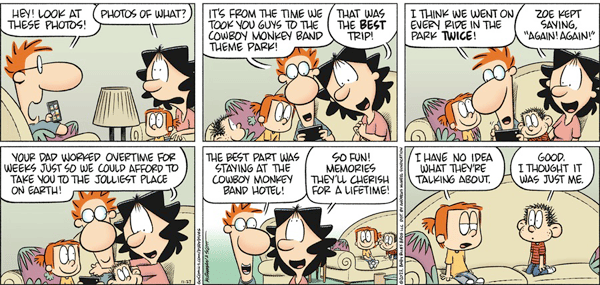
Baby Blues (AMS) touches on a regrettable consequence of our centralized corporate world.
When I was a kid in the ’50s, there were all sorts of small amusement parks scattered throughout the country, including several designed by Arto Monaco, who created a number of those imagination-sparking parks in the years after the war, including Santa’s Workshop in Upper Jay, NY, and Colorado, his masterpiece, the Land of Makebelieve, and western-themed Frontier Town.
The world was also full of ride-oriented places like Hershey Park, which still exists, and others which do not.
I remember visiting those places regularly as a child and, happily, we were able to bring our own kids to them and others like them before most of them disappeared.
I credit Arto with building the best of them, but have to saddle him, as well, with some blame for their demise, because he helped design Disneyland, which opened in 1955 and has since morphed into several similar mega-parks around the world. I suspect it’s the model for “Cowboy Monkey Band Theme Park.”
Thing is, in 1955, simply going to California at all was a once-in-a-lifetime adventure for those who didn’t already live there, with going to Disneyland being an expensive cherry atop an already expensive sundae.
By contrast, we went to our local and regional amusement parks on a regular basis, with one or more of them being a routine part of summer vacation.
But airline travel became more common and, with both Anaheim and Orlando open year-round, the Disney empire overwhelmed the less glitzy small parks and drove them out of business.
However, the mushrooming expense of trips to those megaparks continues to keep them, if not in the “once-in-a-lifetime” mode, certainly not in the “every summer” category, leaving parents in the dilemma Wanda and Darryl faced:
How do you find that sweet spot, when they’re old enough to remember, but young enough to still get a full-throttle thrill out of the experience?
Or should you just piss the money away on groceries, rent and college instead?
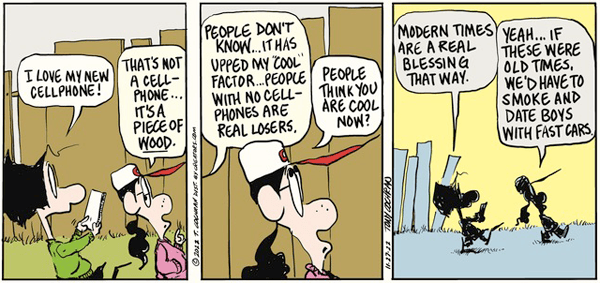
Ah well. Take comfort in knowing that it’s impossible to get it all right.
Agnes (AMS) and Trout have the excuse of living in trailer-park poverty for their constant search to be cool, but I had poor classmates who really were cool despite having little to show for it, and others from more prosperous families who got everything they wanted but were not nearly as cool as they thought they were.
Which could bring up a whole discussion of fans of the British Invasion vs fans of the Beach Boys, but we’ll save that for another day. Or at least to the end of this one.
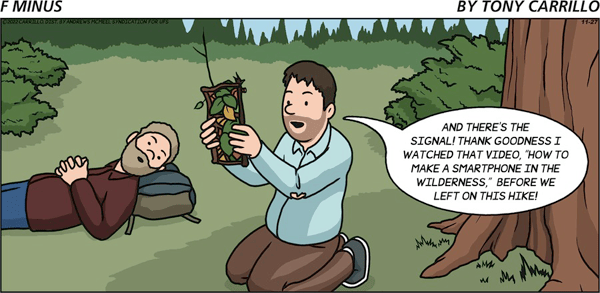
I’m more fascinated at the moment by the Juxtaposition of Agnes’s wooden cell phone proxy and the functional sticks-and-leaves cell phone in today’s F-Minus (AMS).
Crafting such a phone would, until very recently at least, be secondary to finding a signal at all in the wilderness, but I’d note, too, that this doesn’t look like an emergency. I suspect he just wants to do some doomscrolling and watch some music videos instead of listening to birdsong and digging the sunshine.
Else what’s a heaven for?
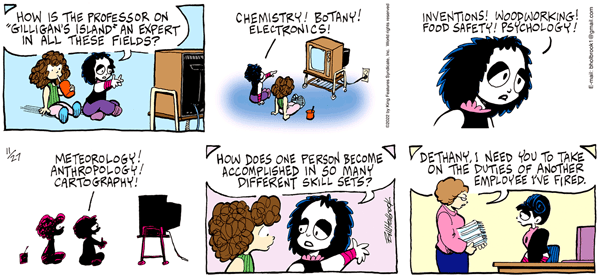
And you may ask yourself, how did I get this wonderful ability to make phones out of sticks? But, as noted in On the Fastrack (KFS), the Professor could have made one out of coconut shells, if there’d been any signals in the atmosphere back then, and I seem to recall him crafting some kind of shortwave radio at least once.
As Dethany explains, being able to do anything without anything has become a necessary job skill, in a world in which our bosses say, “We all have to do more with less” when they mean “you.”
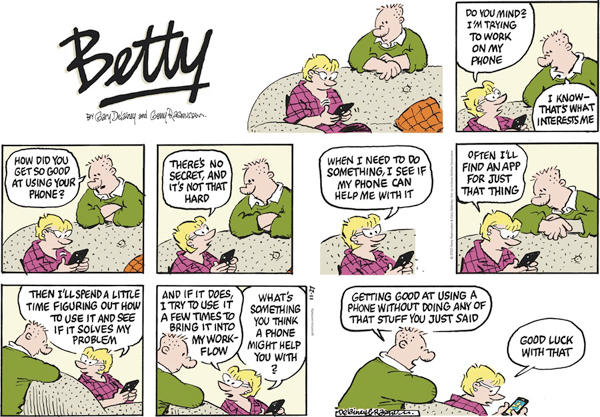
Some of us got it, some of us ain’t, and I admire Betty (AMS) for modeling a character who is bright and professional but still down home.
I’ve never had the impression that Betty has a college degree, but she doesn’t seem to need one, and it’s nice, for a change, to see a blue-collar family portrayed as intelligent, curious and well-mannered, which, in my experience, mirrors reality.
I’ve got the college degree and I’m with Bub on this one. It’s not that I can’t figure out how to activate all those bells and whistles, but I just don’t feel like investing the effort, despite how much Betty thinks I’m missing.

As Wiley suggests in today’s Non Sequitur (AMS), there is nothing more stultifying than a long explanation of something about which you don’t give a damn.
That applies to explanations of how to get my phone to do things which I don’t much care if it does, but it certainly applies, as in this example, to explanations of block chains and cryptocurrency, which is more like explaining how Santa gets to every home in the world, given that I don’t believe in Santa. Or cryptocoins.
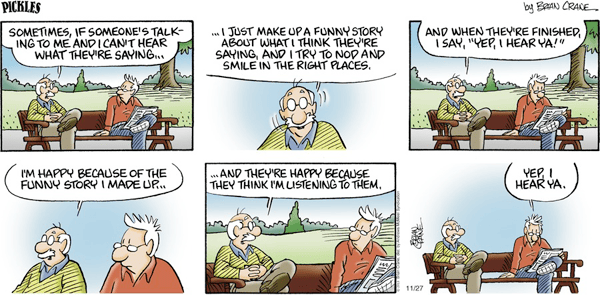
In Pickles (AMS), Earl blames his lack of attention on his failing hearing, but I suspect he could listen a little better if he cared a little more.
Whatever his abilities and intentions, I’m willing to admit that, like the patient in Non Sequitur, long-winded explanations of things that will never have any application in my life just put me to sleep.
But, like Earl, I’m well-mannered enough to at least pretend I was listening to the whole thing. It’s one of the few skills I actually mastered in the course of my formal education.
Practice, practice, practice.
Juxtaposition of the Day
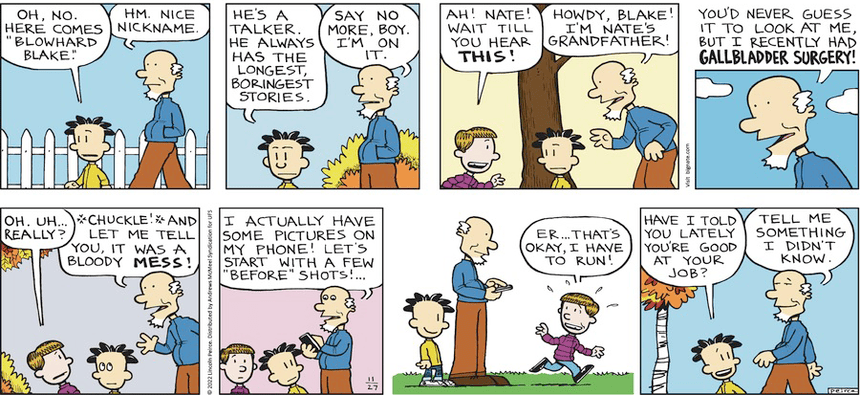
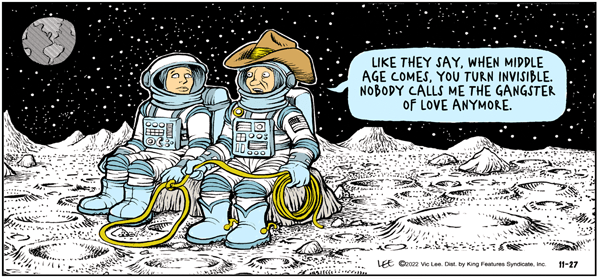
Nate’s grandfather is self-aware enough to know how boring “organ recitals” are, though we old folks share stories with each other, more in solidarity than to be entertaining. My grandfather took the matter too far: He assumed that telling stories at all was the mark of an Old Fart.
The stories we were able to drag out of him were fascinating, and I often wish he hadn’t taken so many more of them to the grave.
OTOH, the fellow in PMP turned invisible not by becoming older but by having pursued momentary advantage.
![]()
Life’s full of choices. And gold records. And predictable consequences.
Fortunately, the most intense colors never really fade:
Comments 8
Comments are closed.